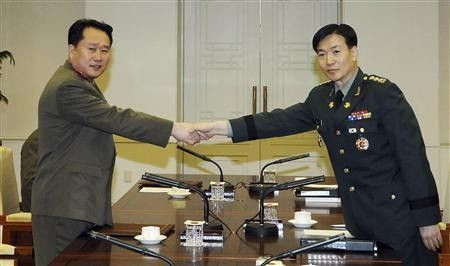Rival Koreas meet for talks as tensions ease

The rival Koreas held their first talks since a deadly attack on a South Korean island last year amid signs of a thaw in tensions as momentum builds for a resumption of aid-for-disarmament negotiations.
Tuesday's preliminary military talks clear one of the roadblocks to a possible resumption of six-way talks aimed at ending North Korea's nuclear-weapons programme, last held more than two years ago when the North walked out.
But analysts remained sceptical about Pyongyang's motives to restart nuclear talks, saying it has reneged on past promises and instead used the funds from donor countries to develop its nuclear programme.
After doling out billions of dollars to its destitute neighbour over two decades, Seoul now insists it will only send aid once the North totally dismantles its atomic programme.
When they (North Korea) need something, which usually means money, they first drive tensions high, then switch to the charm offensive and start talks in order to get something, said Andrei Lankov, a North Korea expert at Kookmin University in Seoul.
If they do not get what they need, they turn the switch back to the confrontational mood.
The two sides failed to reach an agreement on Tuesday, and will resume negotiations on Wednesday about arranging a senior-level meeting, the defence ministry in Seoul said.
Under pressure from the United States and China, host of the six-party talks, the neighbours have toned down their combative rhetoric over the past month and agreed to bilateral talks.
North Korean Colonel Ri Son-kwon patted his counterpart from the South, Col. Moon Sang-gyun, on the shoulder and they shook hands before they started negotiations at the Panmunjom truce village. The pair have met several times over the years.
The meeting was the first between the rivals since November, when the North bombarded the island of Yeonpyeong in disputed waters off the west coast, killing four people.
The two sides met for some nine hours on Tuesday. The South's defence ministry said it had requested information about last year's attack against Yeonpyeong as well as the torpedoing of one of its navy ships last March.
Pyongyang has denied sinking the ship and says the South provoked the shelling of Yeonpyeong by firing artillery rounds into its waters during a military drill.
The two Koreas are still technically at war, because an armistice, not a treaty, ended their 1950-53 civil conflict. They have been involved in dozens of deadly confrontations over the years, including cross-border commando raids, political assassinations, an airliner bombing and military clashes.
SIX-PARTY TALKS
Beijing and Washington had set inter-Korean dialogue as a prerequisite to restart six-party talks. The North has said it wants to return to the broader negotiations, but Seoul and Washington have questioned its sincerity about denuclearising -- pointing to its revelations last November about a uranium enrichment programme.
Pyongyang says the uranium programme, which potentially opens a second route to make an atomic bomb after its plutonium programme, is for peaceful energy-making purposes.
Seoul and Washington want the U.N. Security Council to punish the North for the programme because it contravenes past resolutions, whereas Beijing favours dealing with the matter within the six-party talks, which also involve Japan and Russia.
The issue is expected to be raised at the U.N. Security Council this month, but experts say Beijing, a permanent member of the Security Council, is unlikely to back any new resolution against the North.
The South's Wi Sung-lac is due to visit Beijing on Thursday to discuss the best approach to deal with the North.
Seoul also says its neighbour, squeezed by U.N. sanctions for nuclear and missile tests, only wants to restart six-party talks to get aid. The South says it will only resume economic help when the North totally dismantles its atomic programme.
Tuesday's colonel-level talks are aimed at setting the time and agenda for higher-level dialogue, possibly between their defence ministers. Officials say it may take several rounds of working-level talks to prepare for the senior meeting.
© Copyright Thomson Reuters 2024. All rights reserved.





















